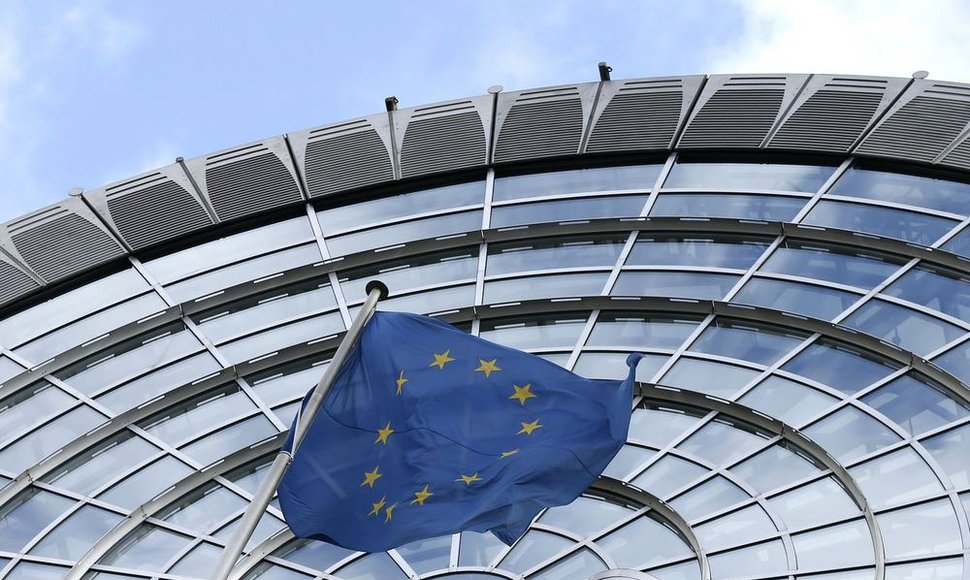LGBT pride in Vilnius can lend a colourful note to start the presidency on. The Baltic Pride, already a traditional annual event rotating among the three Baltic capitals, is scheduled to take place in Vilnius this July.
“We are using the example from Hungary's presidency (in the first half of 2011),” leader of the Lithuanian Gay League Vladimir Simonko tells 15min. “I myself took part in the march in Budapest and saw how the authorities came to an understanding with the organizers. We assume that it was the chairmanship of the EU that mobilized the government's willingness to engage in a dialogue with civil society and to promote human rights.”
A special municipal commission is in charge of issuing permits for events in Vilnius. According to Simonko, the organizers of the Baltic Pride have not yet applied for a permit – they are still contemplating the route to choose for the march and the possible number of participants. “Certainly, we'd love to have the march in the centre of Vilnius. There's still time – for a dialogue. But we do hope the authorities will be sensible,” he says.
When the Baltic Pride took place in Vilnius for the first time in 2010, the event drew much attention domestically and internationally. The route for the march was granted along the bank of the Neris – not in the oldtown as requested by the organizers – on a site which was completely sealed off from the rest of the town, for fear of violent opposition. The event was guarded by 800 police officers who greatly outnumbered the marchers themselves. Baltic Pride was met by an even larger crowd of opponents who were chanting abusive slogans, waving contemptuous banners, crosses, and throwing smoke bombs. A dozen-odd protesters were detained while two parliament members, Petras Gražulis and Kazimieras Uoka, were accompanied out of the territory by the police.
Simonko says he hopes for more people to march in the pride this year than in 2010.
The Baltic Pride is an annual event held in Lithuania, Latvia, and Estonia in rotation. Last year as well as in 2009, the event took place in Riga; 2011, in Tallinn.
According to a diplomat close to the EU, Lithuania, which is holding its first presidency over the Council of the European Union, will have a clean slate and so the message it sends about itself should better be in line with reality. It would not look good if talks about tolerance of Lithuania were followed by some politician or other bashing at the LGBT community.
Vice-Minister of Foreign Affairs Vytautas Leškevičius admits that he thinks “it would be great if the parade took place some other time and not in the beginning of our presidency.” He adds that the police have proven they are able to ensure safety during public events. However, he says, there is a chance that the pride might be scheduled on the same day as some large-scale presidency event in Vilnius; in that case, the permit might be withheld due to traffic restrictions in parts of the town and not due to the government's convictions.
Visits by David Cameron and Angela Merkel
Lithuania will take over the presidency over the Council of the EU in the second half of 2013. Each member state takes a turn of spending six months chairing meetings of ministers, committees, and about 260 working groups. A total of 3 thousand meetings are scheduled for the period, about 200 of them – including 16 meetings of ministers – to be held in Lithuania. The rest will take place in Brussels or Luxembourg.
The biggest event is scheduled for 28-29 November, when state leaders of the EU and Eastern Partnership countries will assemble in Vilnius. As most of the tasks are to do with sittings, drafting of position papers, preparing legislation, and similar office work, the meeting will be the most high-profile event of Lithuania's presidency.
True, should the meeting be limited to diplomatic round-table discussions without any significant and tangible advancements – like facilitated visa regime for certain states or signing of the Ukraine-EU association treaty – it will soon sink to oblivion. Outside factors, too, could overshadow the event. Say, if Greece decided to leave the eurozone on that same week or another volcano erupted in Iceland, no one would give much thought to Eastern Partnership.
The meeting will be an occasion for Vilnius to receive influential statesmen like British Prime Minister David Cameron, German Chancellor Angela Merkel (she, however, could be preoccupied by general elections in Germany this autumn), French President François Hollande. If they agreed to come, so will leaders of Eastern Partnership countries (Armenia, Azerbaijan, Belarus, Georgia, Moldova, Ukraine).
Moreover, President of the European Parliament Martin Schulz has also unofficially promised to visit Lithuania, as MEP Vilija Blinkevičiūtė has recently informed the Lithuanian parliament.
Ambitious chairmanship
The presiding nation inherits most of the agenda for its term from its predecessors. However, it can also steer it in the direction it feels is important.
The Lithuanian Seimas has defined the chairmanship priorities thus: economic growth and financial sustainability; energy security; EU Baltic sea region strategy; Eastern Partnership; effective protection of external borders. The approved budget of the chairmanship is 214 million litas (62 million euros).
Lithuania is taking over the steering wheel during a rather stormy period. It will be the last term before European Parliament elections and the European Commission will be nearing the end of its working cycle. Croatia will be joining the Union during Lithuania's term and there are hopes to close talks on Iceland's membership. European diplomats are looking forward, with certain unease, to February, when EU leaders will reassemble to negotiate the 2014-2020 financial perspective. Several dozen pieces of regulation are required to implement the agreement. And should EU state leaders fail to reach a settlement in February, the burden will be carried over to Lithuania's term.
Prime Minister Algirdas Butkevičius thinks that another challenge looming over Lithuania's presidency will be Bundestag elections in Germany this autumn. According to him, some EU Council meetings can go less than smoothly because of that. He admits that the chairmanship will be a huge challenge, but hopes that Lithuania will be able to cope with it.
Not messing up
Lithuania's go at the helm of the EU Council can help the country shed its label as an EU newbie it is still often perceived as, despite the fact that it joined the EU almost a decade ago. As Vice-Minister Leškevičius has told 15min, it will be a great opportunity for Lithuania to present itself as a reliable partner, to make Europe warm up to it and for Lithuanian public servants and statesmen to gain invaluable experience.
Diplomats say that the most important task will be to assure continuity in the EU agenda. In addition to chairmanship events, there is a specific content to take care of, a task requiring ingenuity in negotiations, flexibility in achieving compromise and firmness in securing things we find essential. Diplomats and analysts familiar with the workings of Brussels say that Lithuania's success or failure of presiding over the EU Council will be down to its ability to mediate in decision-making processes and achieving consensus. Around one hundred acts of legislation will be on the table. “If we finish 90 percent of what put on the table, it will be great,” one diplomat tells 15min.
He says there is no need to be over-ambitious – simply not messing up would be a decent achievement. Leškevičius agrees: “Good chairmanship is smooth chairmanship. It goes by as if unnoticed... We are working to be noted as a country that can show – without unnecessary grand gestures, pomposity – that it is a modern, creative, innovative, and at the same time cosy European state.”
Lack of Brussels flights
About 30 thousand guests visit every presiding country; this, however, might prove to be yet another challenge in Lithuania. Finding direct flights to Vilnius is a notoriously difficult task, unless high officials will not think it below them to use budget airlines. Even booking a flight to Brussels can be a veritable headache.
At the moment, two airlines offer Vilnius-Brussels flights. Belgium's Brussels Airlines operates one flight per day, except Saturdays, while Ireland's Ryanair is offering three weekly flights to Charleroi Airport. One can also book a connecting flight via Riga with airBaltic or via Copenhagen with SAS.
The frequency of flights is not the problem, though, but their times are less than convenient for diplomats and public servants. For example, Brussels Airlines aircraft leaves Vilnius at 2:50 PM and lands in Brussels at 4:20 PM. For a trip back, the plane takes of at 11 AM and lands at 2:20 PM. That means that there is no option to catch a morning flight to a meeting and return home in the evening. To attend one meeting requires three days, extra per diem and booking a hotel for two nights.
Moreover, Ryanair flies to Charleroi Airport, which is about fifty kilometres away from the Belgian capital, and takes off at 7 AM. Connecting flight via Riga takes an entire day.
In the run-up to Lithuania's presidency, the country approached Brussels Airlines with a plea to operate at least two daily flights between Vilnius and Brussels at comfortable hours. The Belgian carrier is allegedly reluctant to concede, saying it is dissatisfied with insufficient passenger flows.
Leškevičius assures that there should be no drama about flights – coming from Brussels via Frankfurt takes three and a half hours. The last presiding country, Cyprus, he says, was much more inaccessible. “No chairmanship has ever failed due to a want of direct transportation links,” he underlines.













